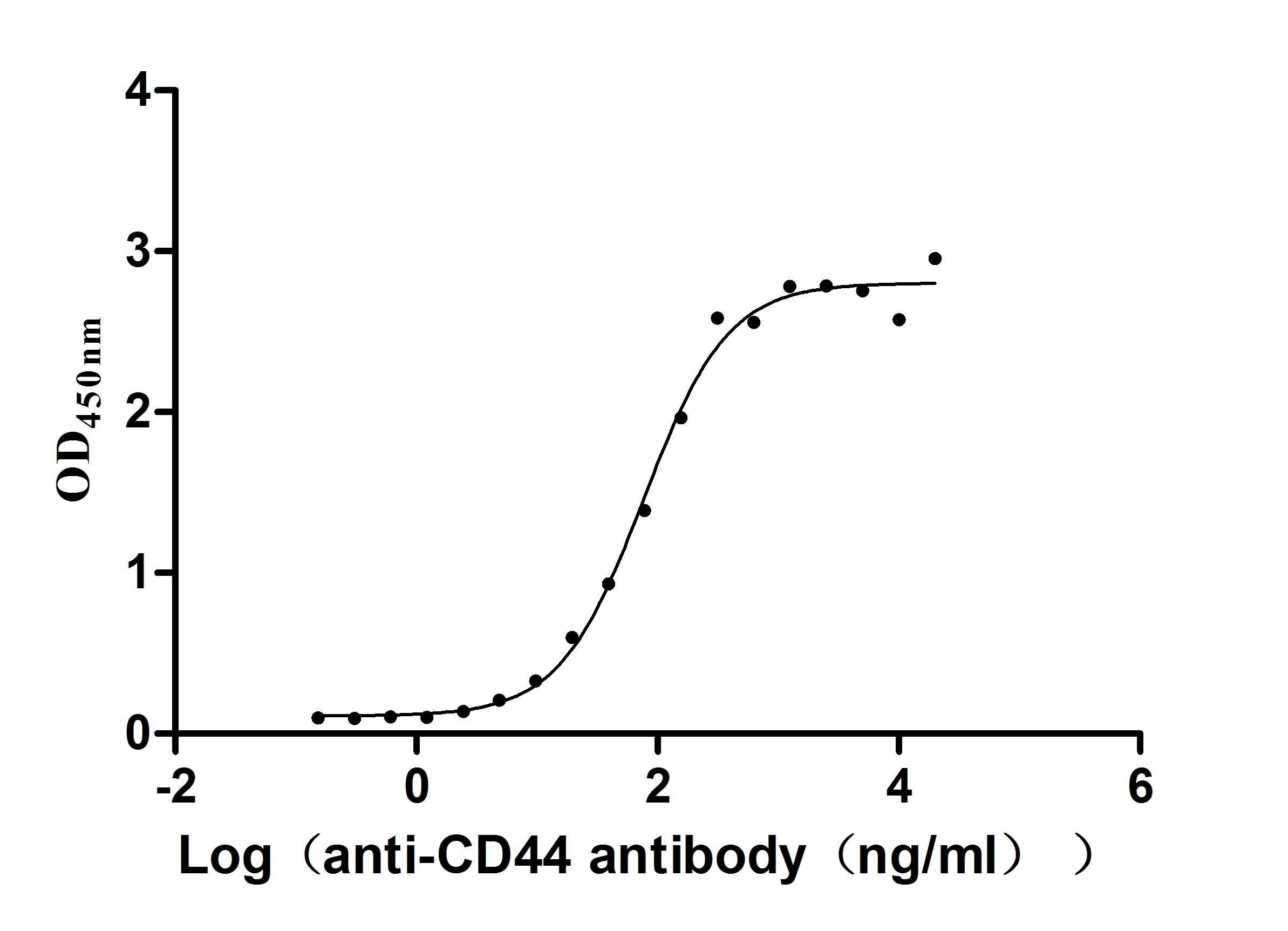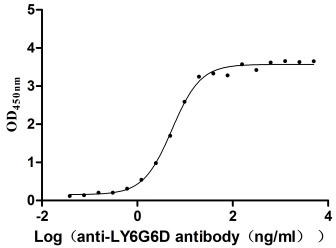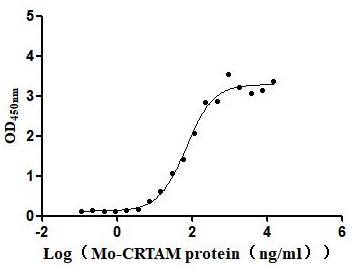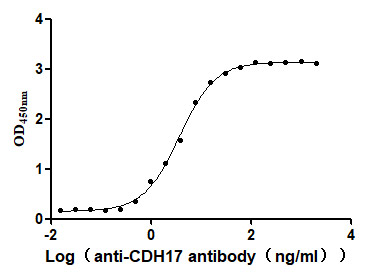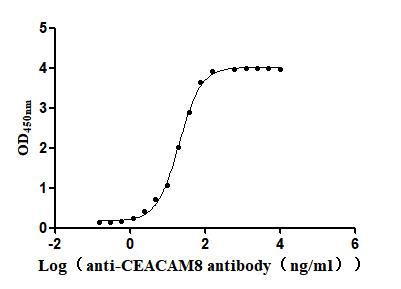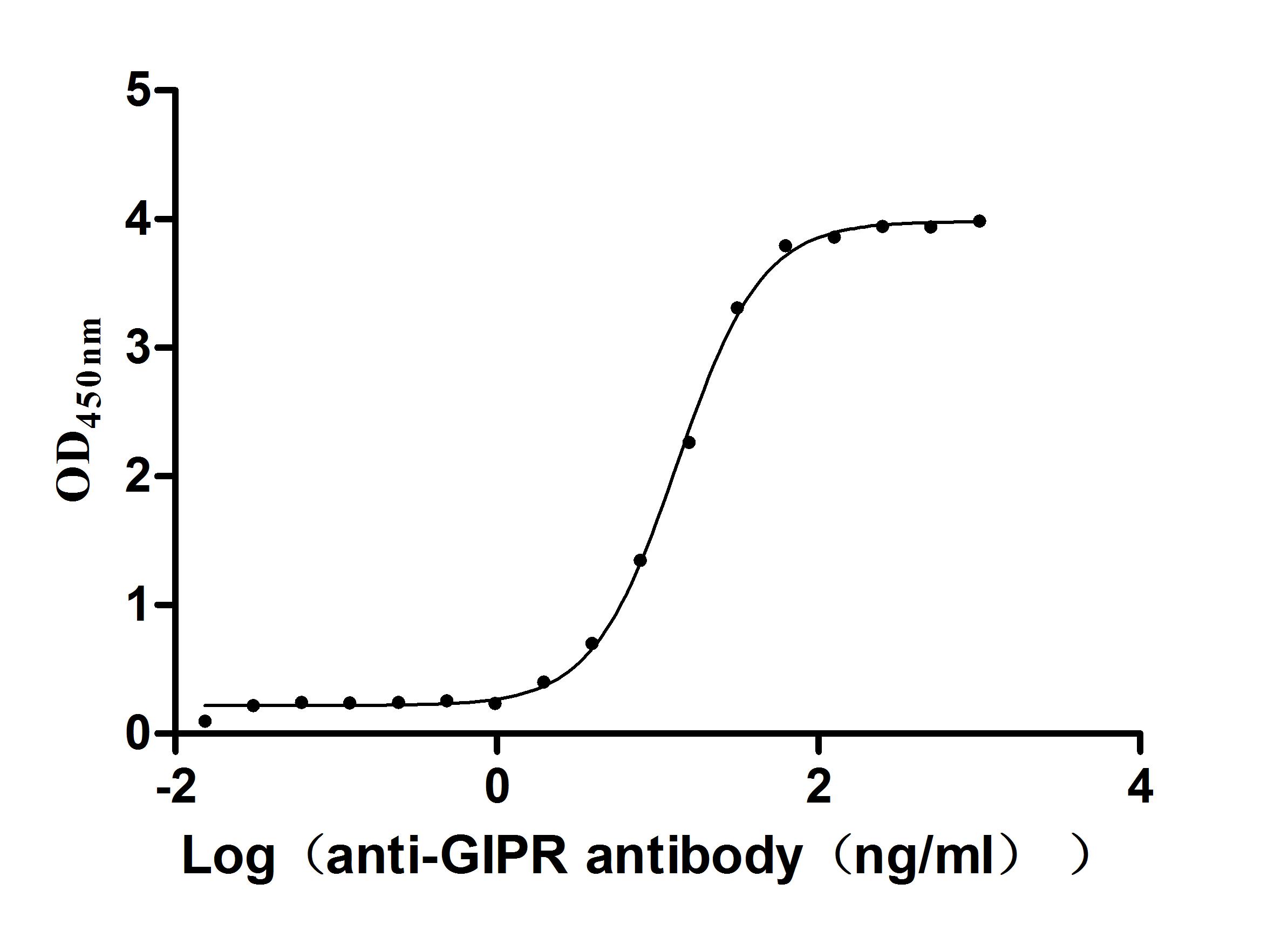Recombinant Human Kallikrein-4 (KLK4 EMSP1 PRSS17 PSTS)
-
中文名稱:
-
貨號:CSB-EP898590HU-B
-
說明書:
-
規格:
-
來源:E.coli
-
共軛:Avi-tag Biotinylated
E. coli biotin ligase (BirA) is highly specific in covalently attaching biotin to the 15 amino acid AviTag peptide. This recombinant protein was biotinylated in vivo by AviTag-BirA technology, which method is BriA catalyzes amide linkage between the biotin and the specific lysine of the AviTag.
-
其他:
產品詳情
-
純度:>85% (SDS-PAGE)
-
基因名:
-
Uniprot No.:
-
別名:Kallikrein-4; EC 3.4.21.-; Enamel matrix serine proteinase 1; Kallikrein-like protein 1; KLK-L1; Prostase; Serine protease 17; KLK4 EMSP1 PRSS17 PSTS
-
種屬:Homo sapiens (Human)
-
蛋白標簽:Tag?type?will?be?determined?during?the?manufacturing?process.
The tag type will be determined during production process. If you have specified tag type, please tell us and we will develop the specified tag preferentially. -
產品提供形式:Liquid or Lyophilized powder Warning: in_array() expects parameter 2 to be array, null given in /www/web/cusabio_cn/public_html/caches/caches_template/default/content/show_product_protein.php on line 662
Note: We will preferentially ship the format that we have in stock, however, if you have any special requirement for the format, please remark your requirement when placing the order, we will prepare according to your demand. -
復溶:We recommend that this vial be briefly centrifuged prior to opening to bring the contents to the bottom. Please reconstitute protein in deionized sterile water to a concentration of 0.1-1.0 mg/mL.We recommend to add 5-50% of glycerol (final concentration) and aliquot for long-term storage at -20℃/-80℃. Our default final concentration of glycerol is 50%. Customers could use it as reference.
-
儲存條件:Store at -20°C/-80°C upon receipt, aliquoting is necessary for mutiple use. Avoid repeated freeze-thaw cycles.
-
保質期:The shelf life is related to many factors, storage state, buffer ingredients, storage temperature and the stability of the protein itself.
Generally, the shelf life of liquid form is 6 months at -20°C/-80°C. The shelf life of lyophilized form is 12 months at -20°C/-80°C. -
貨期:Delivery time may differ from different purchasing way or location, please kindly consult your local distributors for specific delivery time.Note: All of our proteins are default shipped with normal blue ice packs, if you request to ship with dry ice, please communicate with us in advance and extra fees will be charged.
-
注意事項:Repeated freezing and thawing is not recommended. Store working aliquots at 4°C for up to one week.
-
Datasheet :Please contact us to get it.
相關產品
靶點詳情
-
功能:Has a major role in enamel formation. Required during the maturation stage of tooth development for clearance of enamel proteins and normal structural patterning of the crystalline matrix.
-
基因功能參考文獻:
- During the descriptive analysis, the variables ethnicity, biofilm, and gingivitis and the markers rs2242670 and rs2978642 were statistically significant. In the multivariate analysis, the marker rs2242670 and the variable biofilm maintained statistical significance. Genetic variations in the KLK4 gene may contribute to dental decay. PMID: 28445870
- Epithelial-derived KLK4 promotes tumour progression by actively promoting cancer-associated fibroblasts differentiation in the prostate stromal microenvironment. PMID: 28510269
- structural analysis of mechanism of KLK4 inhibition PMID: 27767076
- These findings prompt a new mechanistic model and line of enquiry into the role of KLK4 in enamel hardening and malformation. PMID: 29229389
- Results show that AMTN and KLK4 are not essential for biological processes outside of the dentition or during the secretory stage of amelogenesis. Both KLK4 and AMTN proved to be essential for the maturation of dental enamel, a process that requires the removal of extracellularmatrix proteins and the deposition of ions on the sides of enamel crystallites. PMID: 26620968
- The KLK4 protein is localized in the cytoplasm of tumor and stroma cells. PMID: 28755528
- KLK4 as a potential multifunctional regulator of prostate cancer progression. PMID: 27378148
- Low KLK4 expression is associated with lupus nephritis. PMID: 26546590
- KLK4 may contribute to the metastasis of OSCC through the PI3 K/AKT signaling pathway PMID: 28743213
- KLK4 acts as an oncogene in OSCC cells, and targeting KLK4 may be a promising method for OSCC therapy. PMID: 28150891
- Studied a 70-kb region surrounding KLK4 in East Asian population; found within combined unusual low levels of diversity, high frequency variants with significant levels of population differentiation. PMID: 26420451
- secreted into the extracellular microenvironment by neutrophils stimulated with bioactive mediators PMID: 25563717
- Novel homozygous mutations in the KLK4 (c.620_621delCT, p.Ser207Trpfs*38) were identified in amelogenesis imperfecta consanguinity. Mutant KLK4 was degraded intracellularly and became inactive. PMID: 26124219
- this study provides supportive evidence in favor of a prognostic value for KLK4 in OSCC and suggests that KLK4 could serve as a potential therapeutic target in patients with oral cancer. PMID: 25862839
- Human ephrin-B2 is poorly cleaved by KLK4 while the homologous mouse is not. PMID: 25724897
- miR-378 was predicted to target both KLK2 and KLK4 and downregulated levels detected in prostate cancer patients. PMID: 25153390
- The differential regulation of alternative transcripts (using KLK2, KLK3 and KLK4 as models) by androgens and anti-androgens as an indicator of prostate cancers, was investigated. PMID: 25153393
- KLK4 mRNA positivity could be regarded as a novel independent indicator of favorable prognosis for the disease-free survival of laryngeal squamous cell carcinoma patients. PMID: 24854539
- The variant rs1722561 of Kallikreins might reduce the risk of sporadic intracranial aneurysms among individuals of Chinese Han ethnicity. PMID: 24405067
- These results demonstrate that the activities of AR and mTOR pathways are maintained by KLK4, which may thus be a viable target for therapy PMID: 23798432
- Survival analysis demonstrated that KLK4 mRNA expression constitutes an unfavorable prognostic biomarker in colorectal adenocarcinoma, predicting poor disease-free survival (DFS), independently of the nodal status and tumor size. PMID: 23201139
- amelogenesis imperfecta-causing mutations were identified in three of the probands: 1) a novel single-nucleotide deletion in both KLK4 alleles (g.6930delG; c.245delG; p.Gly82Alafs*87) that shifted the reading frame. PMID: 23355523
- findings provide suggestive evidence of a role for genetic variation in the KLK4 locus in prostate cancer predisposition PMID: 22970239
- signal peptide induces cytotoxic T cell responses in healthy donors and prostate cancer patients PMID: 21874303
- Complex gene expression at the KLK4 locus that might be a hallmark of cis sense-antisense chimeric transcription in prostate cancer cells. PMID: 20406994
- KLK4 is upregulated in early-stage but not late-stage prostate cancer. PMID: 20180634
- KLK4 signaling via PAR1 may represent a novel pathway in colon tumorigenesis. PMID: 20056842
- Kallikrein 4 overexpression is associated with endometrial carcinoma. PMID: 20009893
- Prostate cancer cells exhibit a novel double-paracrine mechanism whereby cancer epithelium produces KLK4 to activate PAR-1 in the surrounding stroma, in-turn releasing cytokines that stimulate cancer cells to proliferate & increase production of KLKs. PMID: 19795418
- The demonstration that KLK4-specific CD4 T cells exist in the peripheral circulation of normal male donors supports the use of KLK4 in whole gene-, protein-, or peptide-based vaccine strategies against prostate cancer. PMID: 12077288
- KLK4 has a unique structure and function compared with other members of the KLK family and may have a role in the biology and characterization of prostate cancer. PMID: 15059887
- A novel human kallikrein mutation associated with a rare autosomal recessive form of amelogenesis imperfecta. PMID: 15235027
- Human kallikrein 4, in particular, and prostate specific antigen, have a functional role in the progression of prostate cancer through their promotion of tumour cell migration. PMID: 16172196
- There are two major isoforms of hK4 (KLK4-254/hK4-254 and KLK4-205/hK4-205) expressed in prostate cancer with different regulatory and expression profiles that imply both secreted and novel nuclear roles. PMID: 16322328
- Here we demonstrate uPAR is a target for tissue kallikrein 4[hK4], cleaved in the D1-D2 linker and D3 domain. hK4 may modulate tumor-associated uPA/uPAR activity by activating the pro-enzyme form of uPA or cleaving the cell surface-associated uPA receptor PMID: 16497155
- Design of serpin fragments as highly specific inhibitors of human kallikrein 14. PMID: 16704423
- an investigation of its enzymatic properties regarding substrate preference, degradation of extracellular matrix proteins, and its inhibition by various inhibitors PMID: 16800736
- hK4 expression and interaction with both tumor cells and osteoblasts suggests a role for hK4 in prostate cancer bone metastasis PMID: 17221837
- KLK4 protein is significantly overexpressed in malignant prostate compared with normal prostate. KLK4 expression is predominantly in the nucleus of basal cells in the prostate epithelium in keeping with its distribution in prostate cancer cells in vitro. PMID: 17545602
- KLK4 and KLK5 activate pro-HGFA. PMID: 18221492
- These data provide insight into KLK4-mediated cell signaling and suggest that signals induced by this enzyme via protease-activated receptors may be important in prostate cancer. PMID: 18308730
- Recombinant hK4 activates ERK1/2 signaling of prostate cancer cell lines, which express both PAR1 and PAR2. PMID: 18567807
- KLK4 may be associated with the development and progression of breast cancer and suggest its potential use in breast cancer monitoring. PMID: 18687310
- KLK4 gene expression may be used as a new potential biomarker in breast cancer. PMID: 19190825
- In a family with a hypomaturation-type enamel defect, mutational and haplotype analyses revealed no mutations in the KLK4 gene. PMID: 19966041
顯示更多
收起更多
-
相關疾病:Amelogenesis imperfecta, hypomaturation type, 2A1 (AI2A1)
-
亞細胞定位:Secreted.
-
蛋白家族:Peptidase S1 family, Kallikrein subfamily
-
組織特異性:Expressed in prostate.
-
數據庫鏈接:
Most popular with customers
-
Express system: Mammalian cell
Species: Homo sapiens (Human)
-
Recombinant Mouse Claudin-18.2 (Cldn18.2)-VLPs (Active)
Express system: Mammalian cell
Species: Mus musculus (Mouse)
-
Recombinant Macaca fascicularis CD44 antigen (CD44), partial (Active)
Express system: Mammalian cell
Species: Macaca fascicularis (Crab-eating macaque) (Cynomolgus monkey)
-
Recombinant Macaca fascicularis lymphocyte antigen 6 family member G6D (LY6G6D) (Active)
Express system: Yeast
Species: Macaca fascicularis (Crab-eating macaque) (Cynomolgus monkey)
-
Recombinant Mouse Cell adhesion molecule 1 (Cadm1), partial (Active)
Express system: Mammalian cell
Species: Mus musculus (Mouse)
-
Recombinant Human Cadherin-17 (CDH17), partial (Active)
Express system: Mammalian cell
Species: Homo sapiens (Human)
-
Recombinant Human Carcinoembryonic antigen-related cell adhesion molecule 8(CEACAM8) (Active)
Express system: Mammalian cell
Species: Homo sapiens (Human)
-
Recombinant Macaca fascicularis Gastric inhibitory polypeptide receptor (GIPR), partial (Active)
Express system: yeast
Species: Macaca fascicularis (Crab-eating macaque) (Cynomolgus monkey)


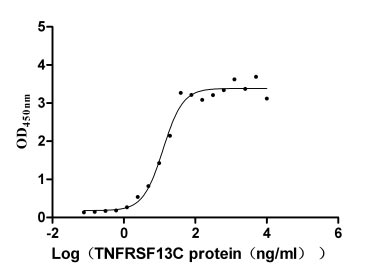
-AC1.jpg)
